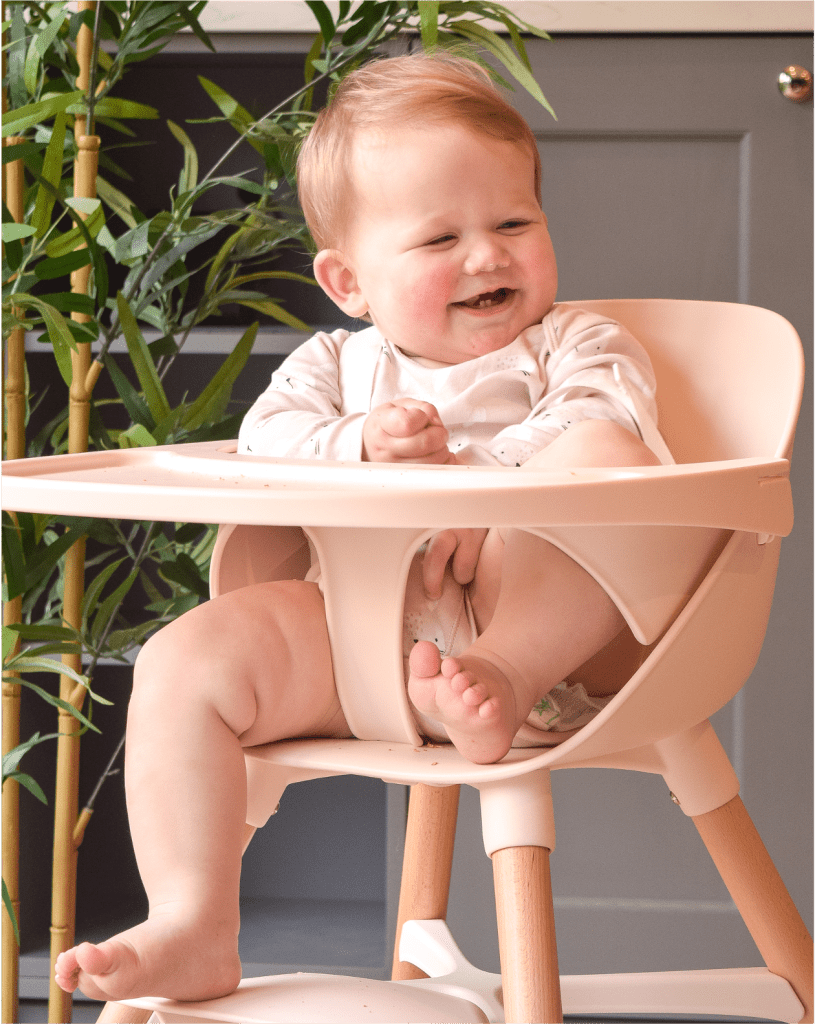
The prospect of your little one’s first food adventure is certainly an exciting one! However, many parents feel confused about when the time is right to embark on their baby’s journey to solids. Perhaps grandparents and friends have been asking why you haven’t offered your baby any food yet; or maybe you’re starting to wonder if weaning might be the answer to all of your sleeping woes!
Let’s start with a look at what the latest guidelines recommend. According, to the UK’s Department of Health, and consistent with other major health bodies including the World Health Organisation (WHO), babies should be introduced to solid foods at around 6 months of age. This is to ensure that a baby’s delicate digestive system is mature enough to handle the gradual transition from milk to solids. Evidence has also shown that introducing solids too early could interfere with the development of infant appetite regulation, which may lead to a greater risk of obesity later on in childhood (1).
Despite these recommendations, many parents in the UK end up introducing solids before the guideline of around 6 months, with 40% starting before their baby has even reached 5 months (2), and there may be a range of reasons for doing so – seen in the chart below (3).
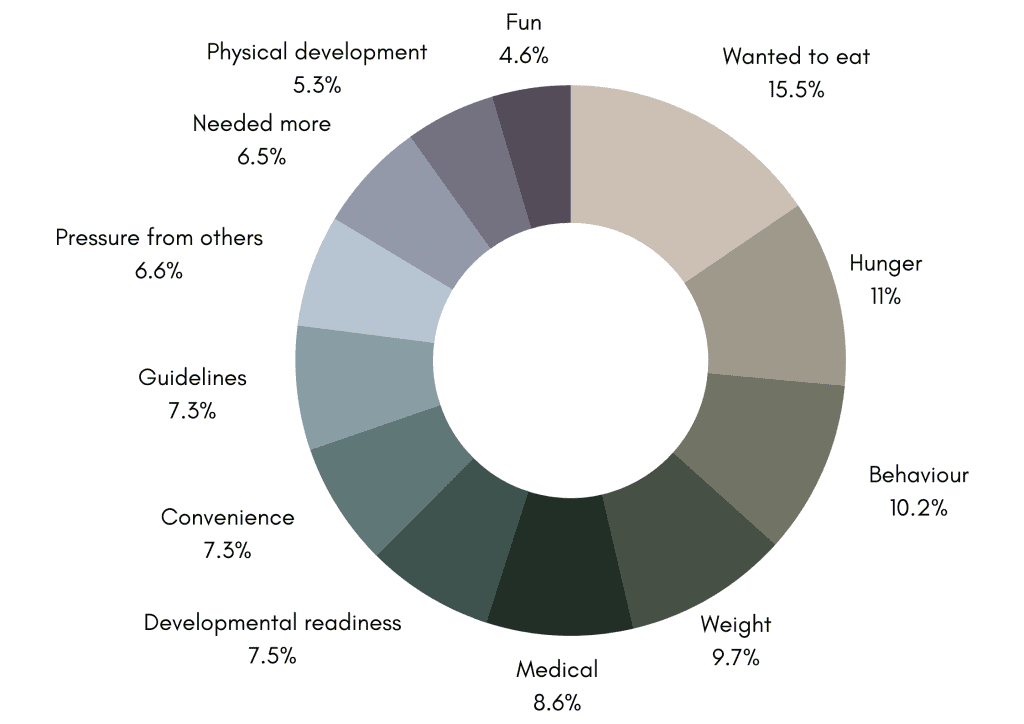
A particularly common driver for introducing solids earlier than 6 months is a desire to encourage better sleep (3). In the hope of a blissfully uninterrupted night’s sleep, you may feel tempted to start sooner on solids. However, remember, this may lead to more sleep disruption for your baby if their tiny tummy isn’t yet ready to properly digest solid foods.
You may find that well-meaning friends and family have the expectation you should be getting started sooner. The guidelines were actually only amended fairly recently (in 2012), replacing the previous recommendation which was to introduce solids at around 4 months. Therefore, you can politely inform anyone who asks, even though you are excited to start the journey, the latest evidence tells us that it’s best if we wait a little longer.
Studies have revealed that food labelling can also be highly misleading for parents – shown to be a significant contributing factor for low compliance with the WHO guidelines in the UK (4). Many commercial baby food products are marketed as being suitable from 4+ months. This can lead to the incorrect interpretation that 4 months must be the right age to introduce a baby to solid foods.
Therefore, whilst there may be rare cases in which your healthcare practitioner advises an earlier introduction of solids for your baby, generally speaking, it’s best to follow the guidelines: wait until around 6 months of age, once your baby is displaying the developmental signs of readiness.
The reason that these guidelines do not prescribe a more specific age is because there needs to be some room to account for your baby’s individual readiness. Like all milestones, the age at which a baby is ready to start solids vary from individual to individual.
The ‘around 6 months’ guide will help you know roughly when to start planning your weaning adventure. However, the exact timing of your baby’s first tastes will depend on when they are showing the developmental signs of readiness. These are milestones which indicate when baby is physically and developmentally ready to start eating solids.
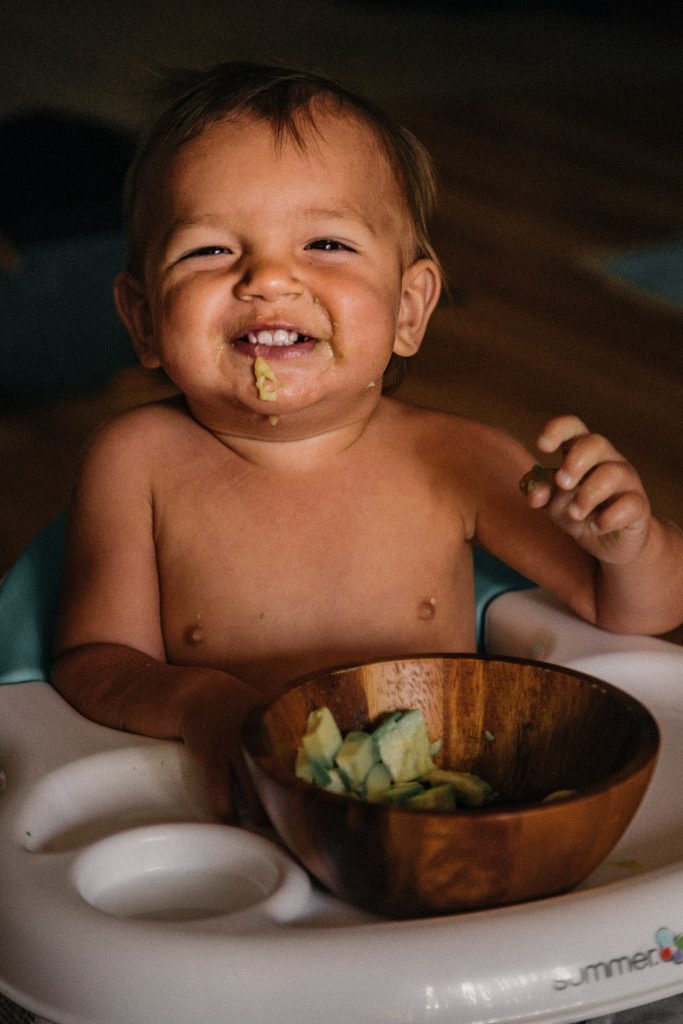

1. Can baby sit up unassisted, hold their neck steady and turn their head away if they are disinterested in eating?
2. Have they lost the ‘tongue-thrust’ reflex, which automatically pushes food out of their mouth, so that they can easily swallow it instead?
3. Do they have enough co-ordination to bring food to their mouth and are they starting to develop their ‘pincer’ grasp?
4. Is baby able to chew? Do they seem ready to participate at mealtimes? (This is the only indicator of readiness once the other milestones have been met, as lots of babies will be interested in food from a young age!)
Do not worry if your baby is ready a little sooner, or takes longer to tick off all the milestones on this list. Although you may want to discuss any concerns with your health visitor or GP, if by 6.5/7 months your baby still doesn’t seem near, it’s important not to delay the introduction of solid foods (and all nourishment’s this brings) for too long.
There is plenty to do whilst you’re waiting to get started (and trust us, you’ll want to cherish these last few weeks of freedom without the extra washing up!)
Why not get baby seated in their place at the family table, as getting them used to sitting in a highchair and enjoying the social occasion of a meal will help the transition when the time comes. Plus, you can give them a bowl and spoon to practice their co-ordination and motor skills.
Mealtimes are about to get a lot more fun!
Follow @feedbabylove on Instagram for more information and tips to prepare for your baby’s journey to solids.
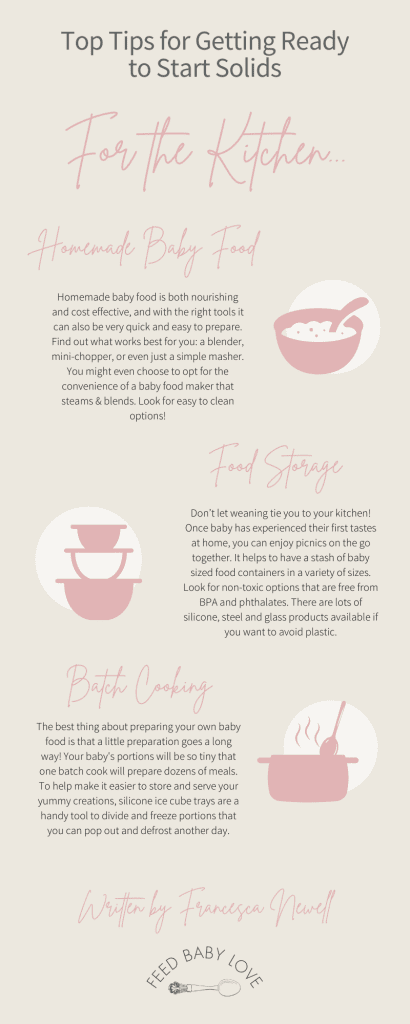
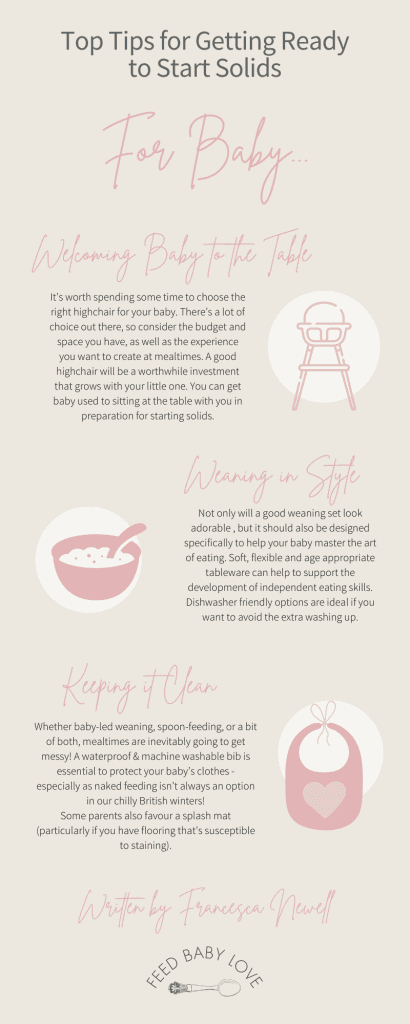


Francesca Newell is a certified baby nutrition consultant having studied at the Oh Baby School of Holistic Nutrition, whose ‘real food’ philosophy is built on a foundation of traditional wisdom combined with the latest evidence-based scientific research. She supports parents in navigating the tradition from milk to solids, with a range of services for babies and toddlers between 4 and 24 months. Find out more at www.feedbabylove.co.uk
1 Susanna Y. Huh, Sheryl L. Rifas-Shiman, Elsie M. Taveras, Emily Oken, Matthew W. Gillman ‘Timing of Solid Food Introduction and Risk of Obesity in Preschool-Aged Children’, Pediatrics, 127(3) (2011). (1)
2 The Office for Health Improvement and Disparities (OHID) ‘Better Health Start for Life weaning campaign: methodology and summary of results ’, www.gov.co.uk (2022). (2)
3 Amy Brown, Hannah Rowan, ‘Maternal and infant factors associated with reasons for introducing solid foods ’, Maternal Child Nutrition, 12(3) (2016): 500-515. (3)
4 Anne Walsh, Lauren Kearney, Nicole Dennis, ‘Factors influencing first-time mothers’ introduction of complementary foods: a qualitative exploration’, BMC Public Health, 15 (2015), article 939. (4)
Cheeky Rascals Limited is a company registered in England & Wales (registered number: 3933118) whose registered office is at Liss Mill, Mill Road, Liss, England, GU33 7BD. VAT number: GB GB689097664. ©2021. All rights reserved.